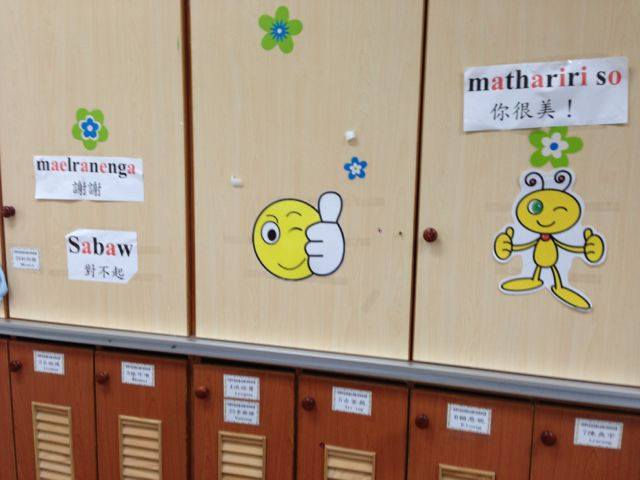Intercultural Education in Taiwan: A Mirror and Window into Human Ecology
- Bonnie Tai
- Jan 28, 2017
- 4 min read

A Rukai kindergartner sits on the floor in a circle of friends—小朋友 (xiao pengyou), or small friends as kids are commonly called here. The teacher is like many kindergarten teachers I hold in high regard. She is energetic, able to redirect more than a dozen children—their attention and energy like a litter of puppies climbing and rolling on top of each other, testing the stretch and strength of their limbs, enjoying the pitch and volume of their voices.
These kids are learning a language many of them hear only at home with their grandparents. Many of their parents will only speak Mandarin and/or Taiwanese, never having learned their parents’ or heritage language in school, perhaps having been discouraged to use it at all.
Today in a concerted effort to preserve the Rukai language and culture, a few hours a week up to middle school may give students enough language proficiency to continue to understand and perhaps respond to their grandparents. Whether they choose to speak and learn their heritage language beyond primary school will be their choice. In high school, they will no longer have an option to continue learning it in school.
The young adults observing them come from all over the world. While amongst them they speak at least seven different languages, all of them attended primary school in their family’s first languages, learned a second language in elementary or high school, and in some cases studied a third or fourth language in college. All of us are hearing a language spoken by a mere thousands of people taught in a language that most of us have only started learning a few weeks earlier.
What are all the ways we are understanding what school means in this place? Is it still a place where we learn to bask in the thrill of discovery—of a new best friend, of symbols corresponding to sounds and words that mean this shirt is blue and that one is green, that we have grown too big to fit the pants our teacher holds before us? Where we learn to respect our elders’ authority?
Or, as we witnessed at the Junyi Experimental High School, is it a place that tries to break down the barriers that keep us on this small, densely populated island, that helps us to understand whether Taiwan’s relationship to the People’s Republic of China is similar to Israel’s relationship to its neighbors? That welcomes young adults to “correct” their understanding of their home countries while they in turn share their knowledge of this country, our home for eleven weeks?
These nine young adults are coming to understand that there are many similar challenges and opportunities in schooling around the world. There are still many public schools focused on preparing students for high-stakes exams that determine which high school, whether to pursue higher education, and then which university they will attend. There are also schools, like the Waldorf schools in Dongshan and Suaoxin and elsewhere in the world that aim to develop students’ hearts and hands as well as their minds. Are all East Asian schools as test-driven as the news media in North American and Europe often portrays them to be? Here is a school teaching students to appreciate the harmonies between individual and group through eurhythmy and the power of forgiveness and alternatives to punching your father in the face through a discussion of Tuesdays with Morrie in English class.
At Tzu Chi University Chinese Language Center, we are learning Chinese in an institution that is by its founding and host culture guided by Buddhist ethics and Confucian precepts. Sacrificing individual freedom for the collective peace might chafe those accustomed to coming and going as we choose, eating what our taste buds most desire, accessing electricity at all hours, and dumping our trash unsorted into a bin without a dozen volunteers helping us to sort our “discarded resources” into as many different bins until we are left with just a previously private handful in a used plastic bag.
As Dorothy Lee writes in her small monograph, “Valuing the Self: What We Can Learn from Other Cultures” about a culture that she studied at
In this society autonomy reigns clear and uncontaminated, strong and sure, so that there is no need to arm against community. Where there is such assurance, and such trust, obedience itself can be an autonomous act, a choosing to submit to the command of the trusted and valued….” (1976, p. 41).
Here in Taiwan, we are learning what 關係 (guanxi) means, both the noun meaning “connection” and “relationship” and the verbs “to concern, affect, have to do with.” Whether these are the terms of our interbeing with friends, teachers, students, or other countries, they are both the same and different from what we think.
And I for the moment have the privilege to be inspired by nine young adults learning a language nearly as they learned their mother tongues; humbled by the challenges of tone deafness, cramped fingers form ideograms whose meaning begin to reveal themselves as sound and meaning, commercial exchange and directional query. We now embark on a week-long celebration of 過年 (guonian) not only to ring in the lunar new year but also to immerse in the study, practice, and teaching of traditional and contemporary Taiwanese arts and crafts; the experience of elders during the Japanese occupation; communication and expression through letter-poems and essays; the meaning devotees make of their faith in Mazu and the religious practices within a local temple; the food systems and culture behind favored Taiwanese recipes; and the cultural significance of well cared for stray dogs, the ubiquity of motor scooters, and musical garbage trucks that draw neighbors together, marking the end of another day.
新年快樂 (xin nian kuai le)! Happy New Year!





Comments